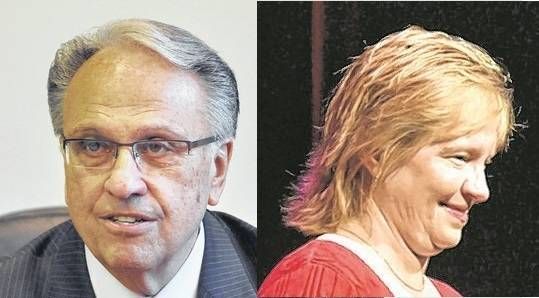Click here to subscribe today or Login.
WILKES-BARRE — Here’s something to talk about.
Former long-running WILK Radio host Sue Henry is running as a Republican for state representative against Democratic incumbent Rep. Eddie Day Pashinski this November.
The opportunity is available because Gregory Wolovich Jr., the Republican nominee in the 121st Legislative District, is vacating the slot solely because he believes Henry would be a better fit.
“I will never give up my passion for people, but right at this time, I think she’s the best option,” said the 25-year-old Hanover Township resident. “I think this is in the best interest of the people of the district.”
Wolovich said he decided to offer his nomination to Henry after her radio post abruptly ended last month due to a contract negotiation impasse.
Henry has a “long, extensive career” talking to the public about their concerns and has a thorough understanding of the issues, which are both “great assets,” he said.
“She has a lot of energy and passion, and she can take the views of the people to Harrisburg,” said Wolovich, a quality assurance technician at the Wegmans Food Markets distribution center in Pottsville.
Henry, 53, of Hanover Township, said Wolovich and others approached her about the run, stressing she had no idea before her radio departure that it would be offered.
The county Republican Party must formally name Wolovich’s replacement, but Henry said party leaders have indicated the nomination is hers.
‘Listening to people’
An adjunct faculty member and overseer of the radio station at King’s College in Wilkes-Barre, Henry said she has been interested in public office for many years while working in the media field, particularly at public events when she would reflect on what she would have done as an elected official in various situations.
“I’ve talked about ideas for 16 years and learned a lot from listening to people,” Henry said.
Property tax reform and the opioid crisis are among the most pressing issues she would address, she said.
Henry said she would back legislation to eliminate or drastically reduce reliance on real estate taxes to fund public education through other means, such as increasing the state’s personal income and sales taxes.
The ongoing lists of property owners facing the auctioning of their real estate due to delinquent taxes is a “disgrace,” said Henry, describing the current school taxation structure as “outrageous, unacceptable and archaic.”
“It’s time to spread this burden,” she said, asserting Pashinski has not “lifted a finger” to advance taxation change. “Where has he been for 11 years?”
Comprehensive options are needed to address drug addiction and prevention, including focus on eliminating the stigma for people who are impacted and “suffering in silence,” she said, noting the stress the problem has placed on police, courts and prisons.
“It’s expensive and heartbreaking and needs a solution,” Henry said.
If elected, Henry said she also would highlight the area’s “rich and important” history, from mining to natives who made significant contributions.
“I don’t want to dwell on only things that are wrong. I want people to once again be proud of where they came from,” she said.
Pashinski responds
Pashinski, 72, said he had heard the news and said he gives credit to anyone who stands up to run for office.
“They have the right to run and if they choose to do so, I give them credit for doing it,” Pashinski said. “I’m going to continue to do the work that brought me to the privilege of serving — health care, education, and protecting American citizens — their working rights, their voting rights and their civil rights.”
Pashinski is seeking his seventh two-year term in the legislature.
Pashinski said for the last four years, he has been working on helping grandparents who are raising their grandchildren. His legislation — House Bill 1539 — is in the Senate Judiciary Committee for a vote on Tuesday. The bill passed the House unanimously.
The bill, called the Temporary Emergency Guardianship, would allow grandparents temporary “in loco-parentis” — Latin for “in the place of a parent” — giving the grandparents the authority to enroll their grandchildren in school or school activities and to receive medical procedures.
“These are issues critical to grandparents raising their grandchildren,” Pashinski said.





